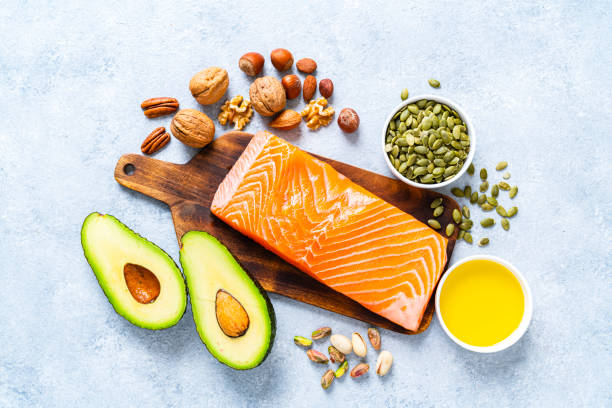By Sheila Dobson, NC
Updated 2/8/2024
Below is a list of healthy fats and following it, a list of unhealthy fats. Its important to know the difference between the two, and to include plentiful amounts of healthy fats in the diet.
Babies and children need an especially fat-rich diet because of their growing bodies and brains. Feeding a low fat diet to a child is damaging!
Adults need adequate fats too; the minimum is about 35% of calories coming from fats. A much higher fat intake, around 50% is beneficial for most individuals.
Healthy fats are important components of our diets because our bodies need fats to make cell membranes, nervous system tissues, hormones, and other bodily components, as well as to fuel our energy production.
Fats are also important nutritionally because fatty foods are the sources of the fat soluble vitamins, A, D, E, and K and they help these vitamins to be utilized and absorbed. Without these fat soluble vitamins in sufficient quantity, the other vitamins and mineral nutrients cannot function as well. This is one reason why low-fat diets can be damaging and dangerous. The key, though is to eat the right fats, not just any fats.
Take care to choose high quality, and if at all possible, organic oils.
Healthy Fats
- Avocados – a rich source of unsaturated fat, mostly oleic acid. Oleic acid is a the stable monounsaturated fat. We call it stable because it does not degrade or change easily when exposed to light and heat.
- Seed oils such as Hempseed oil and Flax oil – these can be used as toppings on food or in salad dressings. They should be cold pressed and ideally unrefined; they should be stored in opaque containers and refrigerated because they spoil easily. These are not to be used for cooking but rather as condiments or ingredients in raw, unheated foods.
- Olive oil – extra virgin, cold-pressed and preferably from a smaller manufacturer. Olive oil contains 75% oleic acid, and a modest amount of saturated fat as well. But choose products carefully! In recent years it has come to light that many olive oil producers in Italy have been cutting their product with lower quality refined olive oil. The country of Italy actually exports more olive oil than they produce! The problem is so bad that by some estimates as much as 80% of the products on the grocery store shelves are adulterated oils. So the knowledgeable shopper needs to look for olive oils from local producers if you are in an area where olives can be grown, or smaller European, California or South American producers. Many good quality oils come from Greece, Crete, Spain, Tunisia, Turkey and other countries in this region. Also, taste and smell your olive oil; if it doesn’t taste and smell good to you — return or exchange it. Beware though, a good olive oil has a bite or a tingly sensation when you eat it. A few good brands you may find locally or online are: Atlas, Bragg’s (the same company that makes the classic, unpasteurized apple cider vinegar), Bionaturea, California Olive Ranch, Cobram Estate, Desert Miracle, Gaea, Gaia, Iliada, La Tourangelle, Lucini, Terra Creta. You may wish to visit bestoliveoils.org to find a good quality oil you can trust, though, the oils listed on this site tend to be gourmet oils, they still do list most of the above brands and many brands that are economical enough for every day use by ordinary people. You also may wish to visit the website, aboutoliveoil.org for their tips on buying a good quality oil.
- Other seed oils: Peanut oil and Sesame oil are similar in their content of oleic acid (around 45%) and saturated fat (around 15%). These oils are relatively stable and can be used for frying therefore. However, both oils are still high in omega-6’s and thus should not be used extensively. Sesame oil is rich in antioxidants which offer some protection from rancidity and oxidation due to heating.
- Full fat dairy such as
- heavy cream, cheese, full-fat yogurt and milk – preferably raw milk sour creme, cultured cream
- Butter or ghee
- Sardines (they contain a fair bit of fat so they also count as a fat; buy them packed in water or oil, but avoid eating the oils as these are mostly low quality oils; Wild Planet is a good brand)
- Fish oils such as those we use as nutritional supplements – however we do suggest avoiding certain brands. I can relay this important information to you in consultation.
- Fatty meats such as beef, lamb or chicken with the fat/skin on, and tallow, goose/duck fat, chicken fat and lard. Eat the fat on meat only if it is good quality meat. In most cases this means it is organic but not necessarily exclusively organic. Some meat is high quality and the farmer has simply not gone through the rigors of the organic certification process. With low quality meats, by which I mean mainly the factory farmed and feedlot meats, the toxin content in the fats will be higher than in the meat since toxins tend to accumulate in fat. If lower quality or conventionally farmed meat is the only meat you can find or afford, you do still need to eat some of the fat, but you will want to limit the amount.
- Almond butter — roasted or raw — preferrably sprouted first then ground (but these products tend to be pricey), also sesame butter/tahini. Nut butters can be rancid on the shelf when you buy them, so try to find freshly ground nut butter. Some experts say to avoid peanut butter which tends to be contaminated with fungus, and some say this is not a concern. It may be an individual matter.
- Hummus (contains olive oil and tahini) – ideally make your own so that you know the quality of the ingredients used
- Eggs – buy pasture raised eggs if possible as these contain as much as 3-4 times the nutrient levels such as vitamin K2, D and E compared to conventionally farmed eggs
Please note: serving size for dairy items is 4 oz except for butter for which a serving is 1-2 tablespoons, the same as with the seed oils. Also note: Bellwether Farms (available in the Southwestern part of the US) is a good brand for yogurt, cultured cream and other cultured dairy, and they offer sheep and goat milk products too. There may be comparable companies offering good quality products in other parts of the country. Often it is possible to determine quality just by tasting and testing the product, once a person has become accustomed to "real food."
This is not a complete list of healthy fats but it is a good start. In general, the faster the oxidation rate, the more healthy fats a person needs. A healthy fast oxidizer generally needs a minimum of two tablespoons of extra fats added to foods for each of three meals daily. A mildly slow oxidizer may need close to this amount! A moderately slow to extremely slow oxidizer usually will need from 2 to 4 tablespoons of healthy fats added to the diet each day. These are general guidelines only! The amount of additional fats beyond what is already in one’s food which a person needs to add to their meals is best determined on an individual basis.
Unhealthy Fats
Seed oils such as
- safflower oil
- sunflower oil
- soybean oil
- cottonseed oil
- “high oleic safflower” oil
- “high oleic sunflower” oil
- “vegetable” oil (a catch-all term for many seed oils)
These oils are high in omega-6 fatty acids which are unstable. Therefore they oxidize readily when you cook with them and they are not shelf stable for long either. They should never be consumed after baking, frying, or heating in any way.
Excess omega-6 oils in the diet are harmful, whether rancid or oxidized or not, and that is another reason to avoid these oils, as all have over 50% of their total fats as omega-6 fats. High oleic versions of these oils are available, which makes them more like olive oil, but the crops that produce these “high oleic” versions have been highly manipulated by breeding and perhaps genetic engineering, and in general those processes result in foods that are far less healthy for us to consume.
Other unhealthy fats include:
- fats from most conventionally raised animals, including
- chicken skin
- dairy fats such as butter and cream
- beef fat or tallow whether refined or as part of a cut of meat
- pork fat or lard
The reasons that the above animal derived fats are considered unhealthy is due to the presence of toxins from agricultural practices that involve heavy pesticide, herbicide and other agricultural chemical use.
This is unfortunate because many people cannot afford to choose organic or other high-quality meat and animal products. Then the question becomes, should those individuals still consume the fats from such foods. I believe that the answer is yes, but in much more moderation than if the foods were organically produced.
Organically produced meats are not the ONLY healthy meats available. Farmer’s markets make available meats that are not necessarily certified organic but which are a good deal higher quality and undoubtedly less toxin-laden than most anything available in conventional grocery stores.
References:
(2019). Drlwilson.com. https://drlwilson.com/ARTICLES/ACETATES.htm
Erasmus, U. (2007). Fats that heal, fats that kill. Alive ; Enfield.
Fallon, S., Enig, M. G., Murray, K., & Dearth, M. (2005). Nourishing traditions : the cookbook that challenges politically correct nutrition and the diet dictocrats. Newtrends Publishing, Inc.
FATS AND OILS FOR HEALTH AND HEALING. (n.d.). Drlwilson.com. Retrieved March 1, 2023, from https://drlwilson.com/Articles/FATS.htm

